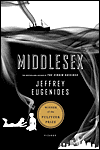On Beauty (Zadie Smith)
 This is my second Zadie Smith book, the first being The Autograph Man, an interesting but ultimately unsatisfying story about opposites. In much the same way, On Beauty is an interesting but ultimately unsatisfying story about physical and mental attraction and worth. Yet again, there is the multi-ethnic smoothie that Smith loves to project upon every corner of the world--a white professor married to a black non-academic with three kids, one religious, one academic and one a horrifying and annoying parody of a rich black kid imitating glorified street culture. (Man that kid bothered me!) Just to add some more drama to the mix, let's throw conservatism against liberalism and art history against deconstructionism. Just for fun, you know, to see what fireworks happen.
This is my second Zadie Smith book, the first being The Autograph Man, an interesting but ultimately unsatisfying story about opposites. In much the same way, On Beauty is an interesting but ultimately unsatisfying story about physical and mental attraction and worth. Yet again, there is the multi-ethnic smoothie that Smith loves to project upon every corner of the world--a white professor married to a black non-academic with three kids, one religious, one academic and one a horrifying and annoying parody of a rich black kid imitating glorified street culture. (Man that kid bothered me!) Just to add some more drama to the mix, let's throw conservatism against liberalism and art history against deconstructionism. Just for fun, you know, to see what fireworks happen.Like a kid in a science lab, Smith seems to be dreaming up experiments and throwing them together to see the results, which she is naturally (and obviously in some areas) making up as she goes along. The result for me was that plot points seemed incredibly artificial and staged--sure, the protagonist's main enemy moves across the ocean to take a position at that specific university. Yep, really likely. Or the mid-life crisis with the balding man lusting after some hot, young student--couldn't she have taken a slightly unique tack on that one? Or the very talented yet poor boy who is buoyed up and ultimately crushed by the system of the insecure rich and over-educated. Nope, I never heard that one before, right?
Zadie Smith is not a bad writer. Quite the opposite. She strings together words into necklaces worthy of princesses in ball gowns and her characters can be strikingly memorable at points. But this book seems like a rushed and mismatched melting pot of ideas, a half-baked plan presented as a main course. And what did I learn about beauty? Not much. However, I did discover yet one more place that it is not. I guess that is something.








